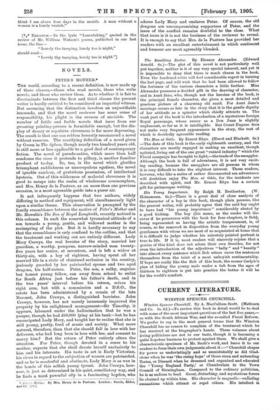put together, neither is it of any very special interest,
and yet it is impossible to deny that there is much charm in the book. Even the hardened critic will feel considerable regret in turning
the last page, and will wish that he had been allowed to follow the fortunes of the various characters a little farther. Miss Alexander possesses a decided gift in the drawing of character,
and in Aunt Jane, who, though not the heroine of the book, is the principal female character, she gives a most detailed and gracious picture of a charming old maid. For Aunt Jane's marriage occurs so late in the story that it is the gentle dignity of her attitude as a spinster which chiefly attracts us. The weak part of the book is the introduction of a mysterious foreign Royal personage, whose career as a Don Juan is slightly unpleasant, so far as it is intelligible. But Count Eugene does not make very frequent appearances in the story, the rest of which is decidedly agreeable reading.
The Man at Odds. By Ernest Rhys. (Hurst and Blackett. (Is.) —The date of this book is the early eighteenth century, and the






































 Previous page
Previous page